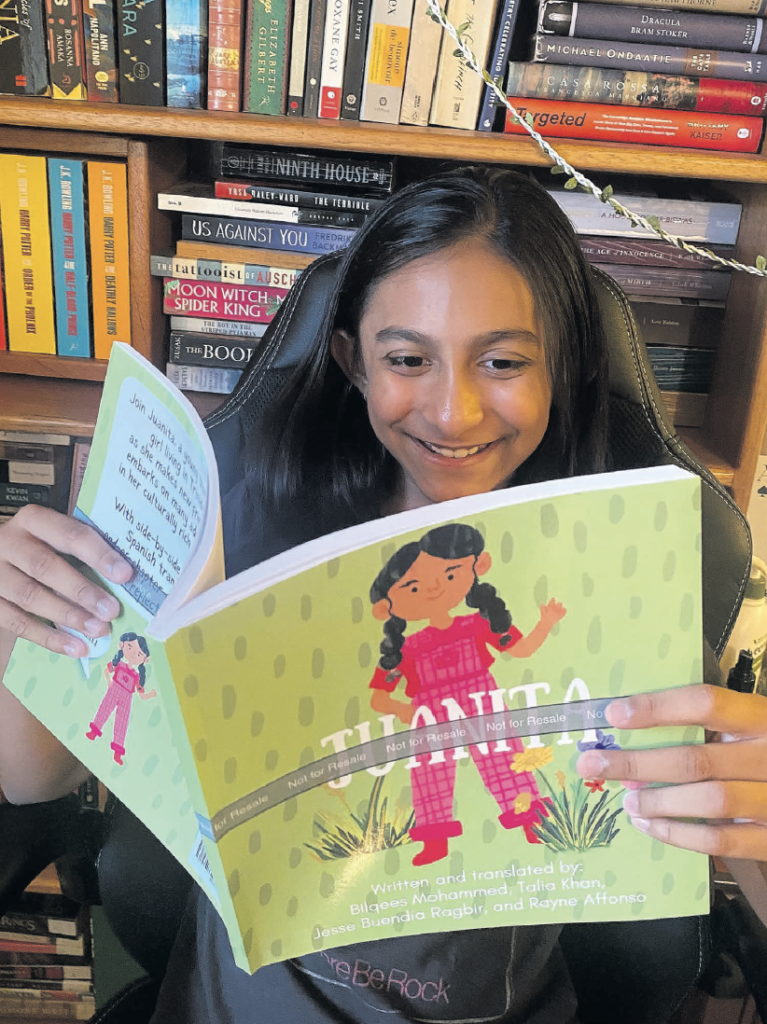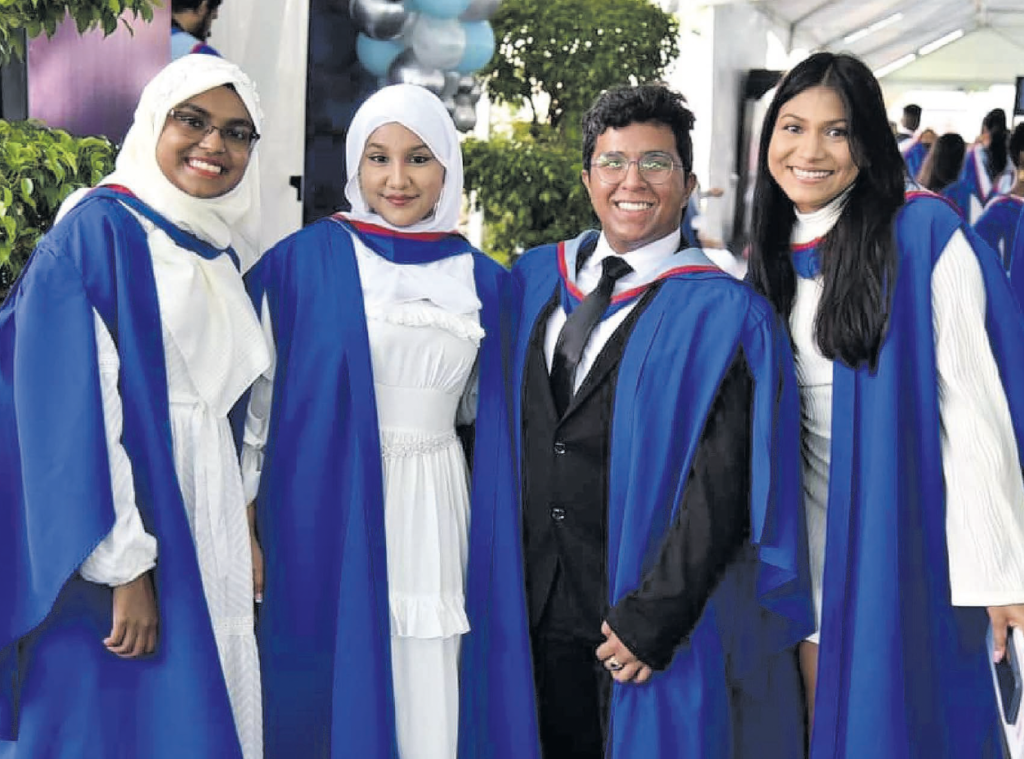UWI graduates co-author bilingual children’s book

“Venezuelan children are growing up in a TT where there are no Republic Readers for them, there is no Boyo and Carla for them, and they do deserve to be represented in some form of local literature. That was really the core of this project.”
The statement was made by Talia Khan, co-author of the newly-published bilingual children’s book, Juanita. Written in English and Spanish, the book follows the adventures of Juana, a recent Venezuelan child migrant to Trinidad, and her diverse troupe of friends, including her cat Malu, as they explore her new country and its culture while navigating the challenges of making a home in a new place.
The book was written by recent graduates in the Spanish programme at UWI – Bilqees Mohammed, Jesse Ragbir, Rayne Affonso, and Khan – who were volunteers in mentoring initiatives for Venezuelan migrant children.
Khan said, “We all did a bachelor of arts in Spanish at UWI, and we all did something called a testing team where we worked with Unicef and UWI together to test Venezuelan children in English, so they would be able to learn at the primary schools, and afterwards we coordinated the migrant mentorship programme at the UWI Centre for Language Learning (CLL). We realised that the ever-increasing migrant population does not have access to bilingual fiction books that have the power to drive imagination and learning. We decided we wanted to write a book for the children because we realised there wasn’t much material available for us to use, so we thought it would be a good idea for us to create our own material as well.”
The book consists of 16 chapters, each containing vocabulary lists, reading comprehension questions, and a written reflection exercise.
The quartet said these activities enhance reader interaction with the text and gradually increase foreign language proficiency.
They said both native English and Spanish speakers can use Juanita to improve their second languages, since the content and exercises are available in bilingual format.
Mohammed said the four divided the work on the book according to their strengths, and then sent it to Venezuelan adults and children for review.
She said Ragbir, who spent half his life in Venezuela and half in Trinidad, was the first person to give them cultural input that might be applicable for Venezuelans living here.
“After we finished the draft, we had several rounds of advanced reading copies (ARCs) sent to children as well as adult Venezuelans. Venezuelan UWI lecturer Romulo Guedez was one of the first people to give us edits and cultural feedback. Both English-speaking and bilingual children gave us feedback as to how they felt, if the work fit the current migrant situation and their own experiences.”
She said the first few chapters were also shared with children in mentoring sessions and they enjoyed them. Khan said she also tested the first three chapters with children at the NGO Ryu Dan Empowerment Foundation in Enterprise, where she was interpreting and teaching English to Venezuelan migrant children.
“They also responded very positively and felt they identified with the stories as well. It was a fun activity, I got to see how they responded and I realised the book might be successful.”
She said the book is not just targeted toward a migrant audience, but also local children. “We want to promote that integration between the two languages, so we don’t want it to just be about Spanish-speaking children learning English, but we want it to be about TT children learning Spanish as well.”
Mohammed said she hoped people would see the book is not specifically about being a migrant or being a foreigner in Trinidad.

“It’s about cultural sensitivity and Trinidadian culture and history, so even Trinidadian kids will find themselves learning a lot. A lot of the topics we cover mirror the social studies curriculum in our primary schools, things like our festivals, religion, culture, etc., so I think even Trinidadians who might not be interested in learning Spanish will have a lot to gain from the content in the English section. If you want to see different aspects of TT and our diversity, if you want to explore different family types, religious festivals, ethnicities and even disability representation, we have all that so even adults might be happy to see representation. Of course, if you are interested in learning a language be it Spanish or if you are a Spanish-speaking person in TT and would like to learn basic English, I would think you would find lots of different uses for Juanita other than it being just a textbook.”
Ragbir said the book wasn’t just about teaching the language, it was about spreading unity and inclusion whether within the cultures or the people themselves. Khan said the book was needed more than ever due to the current socio-political climate in TT.
In 2019, 16,523 Venezuelan migrants registered with the government and received a minister’s permit, which legally allowed them to work for one year. On June 6, 2019, at a post-Cabinet press conference, the Prime Minister said Government could not prevent Catholic schools from educating the children of Venezuelan migrants.
Since then, more than 1,500 Venezuelan children have been studying under the Equal Place programme – a joint effort by the UN Refugee Agency, Unicef, Living Water Community (LWC) and TTVSOLNET (TT Venezuela Solidarity Network). In September 2023, LWC said there were four major requirements for Venezuelan children to be enrolled in the public school system. It said if children didn’t meet the requirements, they could remain enrolled in non-formal education options in person or online.
Khan said, “I really hope we get the exposure and we reach the audience we want to reach. We want these children to understand there is someone out there for them, that they’re not alone in this strange country, with this different language, with these different cultures, these different types of people.
We want them to realise TT is not so different from Venezuela, Cuba, or Colombia. At the end of the day, we are all people and we have the same kinds of culture, we have different foods we like, we all have different music we like to listen to, we all speak a certain kind of language, we have parents that are protective of us.
We just want them to understand it’s not just a few groups of people who are looking out for them, that they have more people out there who have their best interests, and we also want them to not feel a sense of separateness, we want them to feel a unity with TT children.
We don’t want them to feel like they’re only socialising with Venezuelan children or Cuban children, we want them to feel as though they can have TT friends as well and we can live together in unity.”
Mohammed said TT is a land of migrants, and the Venezuelan situation is just another step in the development of the country.
“The relationship between standard English and Trinidadian Creole can be likened to the relationship between English and Spanish. There’s a lot of cultural mixing going on in Trinidad and this is just another step in that process.”
Affonso said the group will be having a panel discussion at the upcoming Bocas Lit Children’s Festival on April 26. “We will be doing an interactive reading with the Venezuelan migrant children that are with Living Water and UNHCR.”
Mohammed said both migrant children and Trinidadian children were invited to and welcome at the session. “Since we’re all Spanish-proficient and the book is bilingual, we want to keep the essence of bilingualism for the session, so it’s really for all the kids to interact with the material and with each other.”
Affonso said the book was self-published through Amazon, as the team wanted the book to be used both for recreation and as a textbook. The book is available on Amazon as a paperback and ebook, and is currently available at Scribbles and Quills bookstore.
For more information, including how to purchase, Goodreads review information and updates, go to @ readjuanita.tt on Instagram.


Comments
"UWI graduates co-author bilingual children’s book"